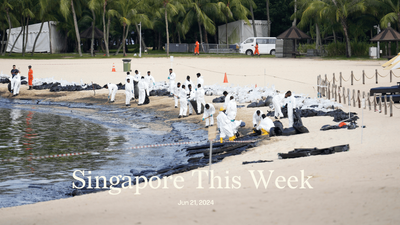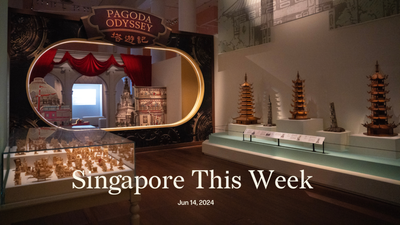Society: May I have a seat please? Err, no.
When a CNA reporter wore a “May I have a seat please?” lanyard on public transport recently, she was met only with curious glances. The bright yellow lanyard was part of a Land Transport Authority (LTA) initiative in 2019 to help commuters with invisible disabilities alert others to their needs. These commuters may not fit stereotypical conceptions of a “disabled” person, but they might have difficulty standing for prolonged periods of time due to medical conditions, like Ehlers-Danlos syndrome (EDS), cancer or Down syndrome. More must be done. Commuters “stare[d] suspiciously” at the reporter or avoided her gaze completely, quickly looking down at their phones after spotting the lanyard. Act blur? Maybe. But those unfamiliar with the campaign might’ve been genuinely confused, as the lanyard is lacking in context: “May I have a seat please?”, with no other information. In surveys, the Caring SG Commuters Committee (which comprises key industry players and ministries like SG Enable, Public Transport Council and Ministry of Transport) found that people want to help fellow commuters, but are often unsure how to. This apprehensiveness is likely reinforced by a lack of understanding of invisible disabilities: how can someone who looks young and healthy be in need of a seat? More awareness of LTA’s campaign combined with a deeper understanding of disabilities will allow Singaporeans to offer the help they already want to give. After all, “daily commutes are not just about moving people from one point to another…They are also about sharing and navigating a common space…All of us can make a difference.”
Society: Kid gloves tighten around written works
Public libraries in Singapore will keep Roald Dahl’s original works, following the controversy over its rewritten versions, in which terms, phrases and sentiments that might upset its young audience—or their “woke” parents, said cynics—were purged. These included words that describe physical appearance (“fat”, “ugly”); colour (“black”); and gender (“woman” instead of “female”). Popular titles from Dahl—an antisemitic children’s author whose works have been accused of misogynistic portrayals—include Charlie and the Chocolate Factory, Matilda, and The Witches. Condemnation from writers ensued. Booker Prize-winning author Salman Rushdie, no stranger to being censored himself, tweeted: “...this is absurd censorship...Puffin Books and the Dahl estate should be ashamed.” Proponents of free speech argue that erasing language that’s become obsolete or unacceptable removes opportunities for discourse and debate. Puffin has sidestepped the issue by saying that it will publish the originals alongside the new—doubling the inventory from a popular but very dead author. (A potentially lucrative compromise for the Dahl estate, having tapped into a new market that might otherwise be opposed to his books.) As to whether the National Library Board (NLB) will acquire the sanitised versions, it’ll assess suitability using its “collection policy”. NLB’s actions may ultimately be guided by conservative impulses from those in power. They may not want to censor Dahl—and may have no interest in alleged “woke” versions of his books—but they have no issues censoring others, to the detriment of a young person’s education and exposure. In 2014, NLB relocated two children’s books that “don’t promote family values” to the adult's section. The stories featured a pair of male penguins who raised a chick together and a lesbian couple, and were almost banned and pulped. Perhaps they should be returned to the children’s section. Fat chance, you say? How about making it an “enormous” one, then?
Internet culture: Lee & Li vs Lee
Lee Hsien Yang and Li Shengwu, the exiled brother and nephew, respectively, of Lee Hsien Loong, the prime minister, have taken to social media to share their views on what’s come to be known as the “Oxley Road Saga”. Lee Hsien Yang published a Facebook post, “Singapore - My Country”, detailing how the prime minister has launched against him “attack” after attack, calling them “abuses of power” (allegations the prime minister has consistently denied since the start of the saga). He said that he and his family “have lost our lives in Singapore, our home, our friends, our wider families and our society.” Reactions online ranged from sadness to dismissiveness. His supporters had hoped he might return to Singapore to contest in the presidential election this year, though in order to do so, he’d first have to cooperate with an ongoing police investigation into alleged perjury. It appears like he has no desire to return under these circumstances. Li Shengwu, an assistant professor of economics at Harvard, wrote a Twitter thread about a “small authoritarian government”. It’s unsurprising that father and son have continued to use social media instead of turning to the press to publicise their positions. Earlier this year, Lee Hsien Yang shared a YouTube video by a user called Sad Coffee, titled “Journalism is a Joke in Singapore”. The video, referencing a parliamentary debate between Indranee Rajah, a minister with the ruling People’s Action Party (PAP), and Leong Mun Wai, a member of parliament with the Progress Singapore Party, describes the mainstream media’s coverage as “biased”, where “the PAP’s response is always given priority in some way shape or form.” While the mainstream media has covered Lee Hsien Yang’s comments, independent online outlet The Online Citizen has questioned the “spin” applied by The Straits Times in its report and how it has “glossed over details”. Thus far, the government has not exercised its legal powers to issue take down or correction orders on the social media posts. It must simply be relieved that it likely won’t face Lee Hsien Yang at the ballot box this year. So must the mainstream media—it’d be much harder to ignore him if he were a presidential candidate.
Arts: A new home online for migrant writers
Migrant worker literature in Singapore now has a home on the web: migrantwriters.sg. The steadily growing body of work includes published books, anthologies, and reading guides. Archives of past programmes, such as the International Migrant Literature Festival and the Migrant Book Fair, are also accessible. One migrant writer, Zakir Hossain, made news last June after his work permit was revoked because of his alleged false statements, according to the Ministry of Manpower. (Mainstream media reports seemed to support his position, as we outlined in this essay on activism in Singapore, which features an interview with Ripon, another migrant writer.) Zakir was vocal about rights for migrant workers both in his social media posts and his poetry. Creative writing is one of the primary ways that migrant workers can share their experiences with the larger Singaporean public. Migrant Writers of Singapore frequently holds readings and festivals. Head to their new online home to stay up-to-date on upcoming events.
Arts: The Obs is Ons tonight
Veteran music group The Observatory is spoken about with reverence by some. “The Obs”, as the group’s sometimes affectionately termed, formed in 2001 and has been a fixture of the local experimental music and art scenes ever since. This week, The Obs is collaborating again with local music label Ujikaji Records for their series titled, “BlackKaji”. This edition of BlackKaji will feature The Obs’ current work-in-progress and collaborations with artists from Singapore and the region. Meuko Meuko, a Taipei-based producer and performer, will make her Singapore debut at the show, joining international guests like NúÚ P3A☭3 (Bangkok, pronounced Nuh Peace), Kadapat, and Kasimyn (both Bali-based). Singapore artists include Rosemainy Buang and Wu Jun Han, in an original collaboration, Lynette Quek, and Irfan Kasban. BlackKaji is on at Projector X: Picturehouse today (March 10th) at 7.30pm. Tickets are available on Eventbrite up until 5pm, after which they’ll be available at the door.
History weekly by Faris Joraimi
Entomologists Cristian Lucanas (from the Philippines) and Foo Maosheng (Singapore) this week identified a new species of cockroach from Bukit Timah Nature Reserve, and named it Nocticola pheromosa. A Pokémon trainer in his spare time, Foo named the species after a doppelgänger from the gaming franchise. It looks rather delicate, unlike the creepy companions in our homes: the Australian cockroach (Periplaneta australasiae) and German cockroach (Blattella germanica). They didn’t really come from those countries, but are widespread across the tropics. My mum remembers how swarms of cockroaches flew inside her late grandmother’s kampong home on rainy nights, with only a blanket for protection from the little terrors. We call them “lipas” in Malay, the Indonesian term “kecoak” coming from Hokkien “ka choa”, a reference to their chirping sounds. Shudder. Malays of old associated their darting movement with energetic activity, and Munshi Abdullah, Stamford Raffles’s interpreter, once made Sophia, his boss’s wife, the object of this poetic comparison: “I noticed that Mrs Raffles was as active as a cockroach without a tail (“lipas kudung”), doing one thing after another; after tidying the house she would sew, and after sewing she would write letters,” he wrote in his memoir. It was a time when people didn’t consider every domestic bug a pest. A cockroach in flight was a sufficiently pretty sight for Malays to inspire poetry, like this pantun collected by British colonial officers RO Winstedt and RJ Wilkinson:
Anak Cina petik berembang
Jatuh sebiji di tepi pantai
Tuan laksana lipas terbang
Saya di bumi bila tercapai?
The Chinese youth picks mangrove apples
One of them falls upon the beach
My beloved is like a cockroach that flies above
I am on earth, how can I reach him?
Tech: Sea Group and PropertyGuru beat market expectations
In a surprise performance that sent its stock jumping, Sea Group posted a positive net income of US$422.8m (S$569.4m) in Q4 of last year, an improvement from a net loss of US$616.3m (S$830m) in Q4 2021. Revenue for Q4 2022 was around US$3.5bn (S$4.7bn) and most of it came from its e-commerce arm Shopee. Sea cut expenses, including 7,000 jobs, and withdrew from underperforming markets, resulting in significant bottom line improvements. Meanwhile, compared to a year before, property portal PropertyGuru reported 81 percent lower losses of US$3.9m (S$5.3m) in Q4 2022; and their marketplace revenue increased 15 percent to US$28.2m (S$38.2m). Singapore and Malaysia markets contributed to the growth in revenue while Vietnam saw a decrease in contribution. The company’s performance comes amidst headwinds, such as rising interest rates globally and government credit intervention in Vietnam that hampers home purchases. PropertyGuru has expanded into home-related services, such as cleaning and laundry, through an acquisition of Sendhelper last October. Taken together, these signs suggest that within South-east Asia, the cash-burning start-ups of yesterday can become profitable unicorns with strong shareholder return.
Tech: Ninja Van delivers PR services
Looking for a last-mile delivery provider? Ninja Van, a Singapore-based express delivery firm, is offering a free public-relations-as-a-service (PRaaS) to its customers through their loyalty program, Ninja Rewards. Ninja Van’s internal surveys found that 44 percent of shippers across South-east Asia showed interest in exploring the impact of PR on their businesses. Besides PRaaS, Ninja Van has also launched several value-added services in the region, such as launching creative hubs in Indonesia and masterclasses in Singapore, Thailand, Malaysia, and the Philippines. This focus could be due to the marketing-heavy nature of e-commerce companies, primary customers of Ninja Van’s delivery services, particularly at a time where their growth trajectories are expected to slow. One hopes Ninja Van’s tactics can help it ride out the slowdown before it has to raise its next round of capital, whether in the private or public markets.
If you enjoy Jom’s work, do get a paid subscription today to support independent journalism in Singapore.







